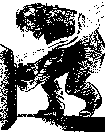
Disillusions of Anarchy:
The Common Perception of Anarchy in Modern Day Society

The definitions one discovers through the internet for anarchy are far off from the original intentions of anarchists. Several of the definitions I found were fairly accurate in explain anarchy in a few words, but more often they were not.
An anarchist definition of anarchism found from The Encyclopaedia Britannica, 1910 is:
"the name given to a principle or theory of life and conduct under which society is conceived without government - harmony in such a society being obtained, not by submission to law, or by obedience to any authority, but by free agreements concluded between the various groups..."
Most of the definitions found of anarchy state that it is a society of chaos, but one site I found actually has a definition that, although it does not reflect all the aspects of anarchy, does describe the central idea of a society without rule. The definition on (An) Anarchy Home Page is:
"Any form of societal organization without a ruler or other form of centralized, coercive control."
A web page on Defining Anarchism does a good job of explaining the roots of anarchism in reference to the current view of it.
The article states that:
"These modern dictionary definitions of anarchism are based on the writings and actions of anarchists of history and present and represent a positive theory..." but that "Exterior sources, however, such as the media, will frequently misuse the word anarchism and, thus, breed misunderstanding."
I found several websites devoted to Anarchy alone. One of these websites has a definition of it that is accurate in many senses of the defintion. The Nexus Anarchy Page states that:
"Anarchy is any social relationship that involves neither dominance nor submission. It is the absence of social hierarchy, with no one imposing their will on another by force or threat of punishment. Anarchy means "without a ruler", or "without government". Government here is meant in the sense of "governing over" and forcing compliance through coercion. Such order is violent order. Anarchy, by contrast, is inherently cooperative- people relating to one another as equals."
This definition encompasses the idea that anarchists do not have a problem with government dirrectly, but with the fact that it creates a hiearchy and gives power to select individuals.
Another page I found expressed a current idea of anarchy that many people hold. The Pagestates:
"Anarchy means only two things. Death and destruction."
Another page with a less than accurate definition of anarchy is entitled: ANARCHY: Welcome to Chaos.
This page claims that there are ten things that one can do to promote anarchy. These ten things include:
1. OVERTHROW A SMALL COUNTRY AND ERADICATE IT'S BASE ECONOMY.
2. PLANT A BOMB IN THE WHITEHOUSE...
3. OR SNEAK INTO THE PRIME MINISTERS HOUSE WITH A JACKNIFE (HEHE)
4. BOMB A WORLD TRADE CENTER
5. ASSASINATE A PRESIDENT...LIKE JFK.
6. BECOME TOTALY INSOLANT TO AUTHORITY.
7. KILL A COP...(EH, WHAT'S THE LOSS? A DONUT DISPOSAL?)
8. START A METAL BAND
9. HACK THE PLANET INTO SUBMISSION. (HEHE)
10. DON'T VOTE.
The ideas expressed on the web page are related to common misconceptions about anarchy.

This view of the government is not that rules and laws are unneccesary, but that the state is a body which will inherently begin to exploit the people it wishes to protect. The view of anarchist is summed up very well in Michael Bakunin's Power Corrupts the Best Bakunin says, "The State is nothing else but this domination and exploitation regularised and systemised." The idea is that because the state and those who run the state have power that is not granted to the rest of society, those who have power will use it to exploit and corrupt others. This is the basic reasoning behind the lack of government in an anarchist society. It is the belief that all people are equal and that all people deserve not to be dominated by others.
Anarchy does not promote a system that is lawless, but a system in which individuals govern themselves. Decisions in anarchy would not be made by the ones in power, but by all individuals involved. The original idea behind government is that people can live together without over stepping the boundaries of their individual rights and trampling on another's rights. Anarchy does not allow people to live without order, to kill without consequence. A person who kills another or in anyway infriges on another's freedom is not a true anarchist.
Many of the sites I found expressed an opinion that is contradictory with this idea. Anarchy has recently been related to computer hacking. The idea is that because anarchy has no rules, it is acceptable to do damage to others through the internet and networks. They believe that anarchy deals with the idea that personal property is an evil. Although Pierre-Joseph Proudhon says that if he were asked, "What is property?" should I not answer in the same way, "It is theft, without fearing to be misunderstood, since the second proposition is only a transformation of the first?"
Proudhon's idea that personal property will create distinctions between groups of people and create inequality is remarkable defined in his writings on What is Property? Property is not the problem in anarchy, but the inequality that it causes is a problem. The current idea of anarchy as chaos and lawlessness ignores the entire idea of collectivism in which a group of people can live together. The idea is that if everyone has a task. Everyone has a say in all decisions that are made. There is no one person who is in charge. People can then live peacefully without government and property.
There are many misconceptions about anarchy. Many internet pages are devoted to this misconception. Some of the web sites above promote the idea of anarchism as lawness, but many do a very good job of supply accurate information and history of the anarchist movement.
